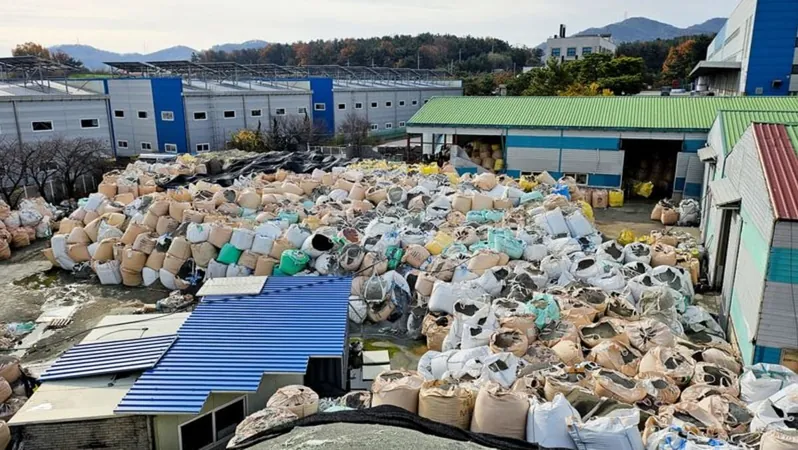
South Korea's Plastic Waste Crisis: Can Recycling Efforts Keep Up?
2024-11-22
Author: Nur
South Korea's Plastic Waste Crisis
SEOUL — South Korea, often lauded for its ambitious recycling initiatives, faces a sobering reality as it prepares to host critical discussions for a global plastic waste agreement known as INC-5. Experts warn that the country's recycling statistics may paint a misleadingly rosy picture of its actual performance.
While South Korea boasts a recycling rate of 73% for plastic waste—far exceeding the United States' estimated 5 to 6%—activists and environmental experts argue that this figure may not accurately reflect the true extent of successful recycling. "This number is deceptive," emphasizes Seo Hee-won, a researcher at the Climate Change Center. "It merely accounts for plastic waste reaching recycling facilities, regardless of whether it ultimately gets recycled, incinerated, or sent to a landfill."
Discrepancies in Recycling Statistics
In stark contrast, Greenpeace estimates that the nation's actual recycling rate hovers around 27%. A major contributor to this discrepancy is a growing reliance on single-use plastics, spurred by the increasing packaging demands from online shopping and food delivery services that skyrocketed during the COVID-19 pandemic. South Korea's plastic waste production surged from 9.6 million tonnes in 2019 to 12.6 million tonnes in 2022—a staggering 31% increase within three years.
Challenges in Waste Management
This surge poses a significant challenge, as many recycling facilities are overwhelmed by sheer volume. A notable example includes a closed recycling operation in Asan, approximately 85 kilometers south of Seoul, where 19,000 tonnes of untreated plastic waste now pile up, emitting a tainted odor. The facility's owner allegedly faced financial difficulties, leaving cleanup efforts on the back burner with an estimated cost of up to US$2.14 million for removal.
Government Regulations and Challenges
Despite South Korea's reputation as a recycling leader, structural problems persist. Regulations on single-use plastics have recently been relaxed, allowing for the continued existence of problematic packaging materials. "The government’s approach lacks clear, actionable goals for reducing overall plastic use and promoting reusable alternatives," remarks Hong Su-yeol of the Resource Circulation Society and Economy Institute.
Corporate Influence on Policy
Adding to the complexities of South Korea's waste management landscape are the powerful petrochemical companies that shape policy through financial influence. "These corporations significantly fund government initiatives, which raises concerns about the strength of the environmental ministry's authority," a recycling industry source, who wished to remain anonymous, noted.
Government Initiatives and Innovation
President Yoon Suk Yeol underscored the need for more robust strategies against plastic pollution at the recent G-20 summit, affirming South Korea's commitment to the upcoming INC-5 talks. The government is taking steps to encourage innovation in recycling technology. Companies like LG Chem and SK Chemicals have been permitted to utilize advanced processes such as pyrolysis and depolymerization to convert plastic waste back into usable materials. However, these methods come with high costs and environmental drawbacks, including increased carbon emissions.
A Collaborative Approach to Solutions
To navigate this multifaceted crisis, prominent figures stress the importance of collaboration between public authorities and private companies. Jorg Weberndorfer from the EU Delegation to South Korea emphasized, "You need businesses that genuinely advocate for change, working in tandem with government efforts to create sustainable solutions."
Conclusion: The Path Forward
As South Korea showcases its achievements in recycling, the nation must confront the pressing realities of its waste management system. Can the government's recycling efforts rise to meet the evolving challenges posed by plastic waste, or will the country find itself overwhelmed by its own success?



 Brasil (PT)
Brasil (PT)
 Canada (EN)
Canada (EN)
 Chile (ES)
Chile (ES)
 España (ES)
España (ES)
 France (FR)
France (FR)
 Hong Kong (EN)
Hong Kong (EN)
 Italia (IT)
Italia (IT)
 日本 (JA)
日本 (JA)
 Magyarország (HU)
Magyarország (HU)
 Norge (NO)
Norge (NO)
 Polska (PL)
Polska (PL)
 Schweiz (DE)
Schweiz (DE)
 Singapore (EN)
Singapore (EN)
 Sverige (SV)
Sverige (SV)
 Suomi (FI)
Suomi (FI)
 Türkiye (TR)
Türkiye (TR)